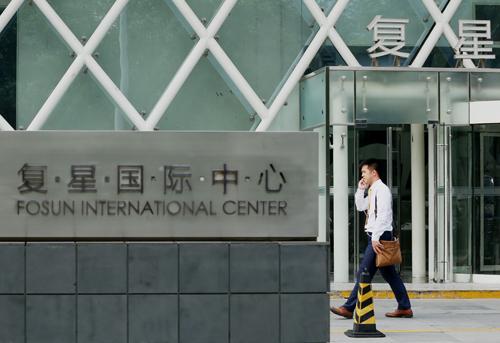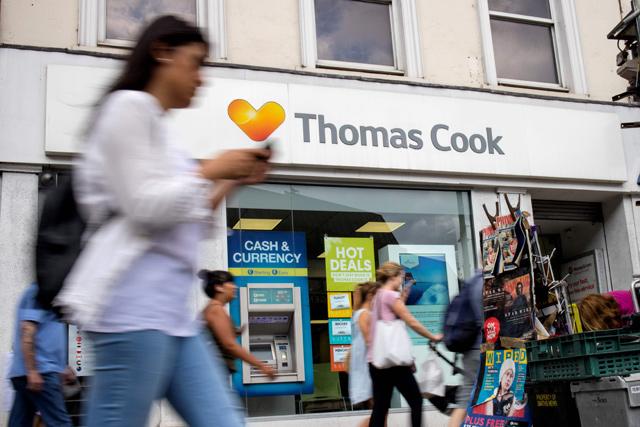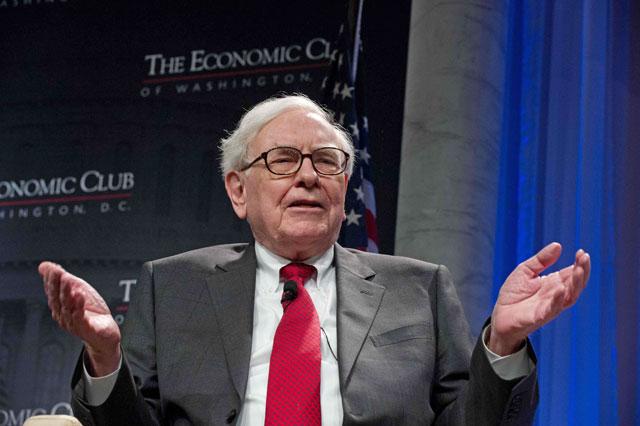You are here
China's giant 'Unicorn' Fosun races for more deals
By AFP - Aug 04,2016 - Last updated at Aug 04,2016

This photo taken on July 29, shows a man walking past the headquarters building of Fosun International in Beijing (AFP photo)
SHANGHAI — A string of overseas investments has shone a new spotlight on Chinese conglomerate Fosun, after the mysterious disappearance — and re-emergence — of its tycoon chairman rattled investors.
In the space of three days last week, the Shanghai-based company bought a stake in an Indian drugmaker for $1.26 billion, acquired a Brazilian investment firm and announced plans to take a stake in Portugal's biggest private bank.
That came only a week after it bought English Championship football club Wolves, and two months after it was part of a consortium that signed a memorandum of understanding to buy Athens' former main airport. Last year, it won a long-running battle to take over French holiday resorts group Club Med.
Founded 24 years ago by a group of classmates from China's prestigious Fudan University, Fosun has announced more than $15 billion in overseas acquisitions since 2010, according to Bloomberg News.
Started with capital of just 38,000 yuan (now $5,760), the company was an early investor in China's pharmaceutical and steel industries, before branching out into numerous business sectors including insurance and financial services.
The Chinese government has for years encouraged companies to invest abroad to secure natural resources, open new markets and gain access to foreign technology, but the weak global economy has presented new, attractive targets.
Chinese firms' overseas merger and acquisition deals more than doubled by value year-on-year in the second quarter, according to law firm Baker & McKenzie, surging 132 per cent to over $40 billion.
"Lower valuations of overseas companies dragged down by the slowing economy have made them more attractive to Fosun in terms of price," Sam Chi Yung, strategist at Delta Asia Securities in Hong Kong, told AFP.
"Fosun has taken advantage of the circumstances to buy more overseas."
In a two-track approach, Fosun chairman Guo Guangchang has urged proceeding slowly on future development to refine the $60 billion company's existing products and services, but moving fast to seize opportunities.
"When we have a very good product, we will allocate all resources to it, so that it quickly develops into a 'Unicorn'. Fosun eventually will become a giant 'Unicorn' with enormous power," Guo said in the firm's annual report in March.
The term unicorn typically describes technology startups valued at over $1 billion.
Oracle of China
Guo, often described as China's Warren Buffett, is China's 19th richest person according to Forbes magazine's most recent ranking, with wealth of $5.4 billion. He cites investor Buffett, known as the Sage of Omaha, as an inspiration, along with industrial company GE and investment bank Goldman Sachs.
Hong Kong-listed Fosun reported a profit of 8.04 billion yuan in 2015, up 17.3 per cent, according to its annual report.
Guo dropped out of view for several days late last year, amid a corruption crackdown launched by authorities which had targeted high-ranking government officials and corporate executives. His disappearance sparked speculation he too had fallen to the anti-graft campaign, spooking investors and companies doing business with Fosun.
The firm said the chairman was "assisting in certain investigations" conducted by authorities, without ever giving details.
Guo is well-connected politically, being a member of the Chinese People's Political Consultative Conference, a discussion body that is part of the Communist Party-controlled governmental structure.
He has returned with a vengeance, judging by his latest deals. Fosun has just announced it is acquiring Brazil-based investment management firm Rio Bravo, while its pharmaceutical arm is taking an 86 per cent stake in India's Gland Pharma, both as part of a push into developing countries.
"Our strategic deployment in Europe and the US is relatively complete. In emerging markets, it has just started," Guo told Bloomberg in May.
But at the same time it has accumulated billions of dollars in debt to pay for its purchases, and chief executive officer Liang Xinjun recently told Bloomberg Television that it might sell some assets to pay down the load.
Related Articles
BEIJING — China’s Fosun Group is considering nearly a billion dollar rescue of embattled British tour operator Thomas Cook, the Hong Kong-li
Billionaire investor Warren Buffett said on Saturday that stock prices would appear expensive if interest rates normalised from their ultra-low levels.
NEW YORK — Berkshire Hathaway, the holding company of US billionaire investor Warren Buffett, received a stunning $29 billion last year from


















